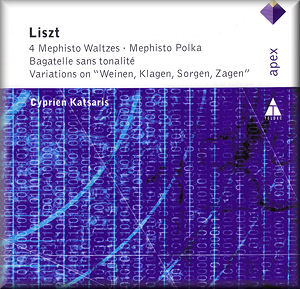 |
 |
|


alternatively
CD: MDT |
Franz LISZT (1811-1886)
Mephisto Waltzes: No. 1 (The Dance at the Village Inn)
(before 1861) [11:07] No. 2 (1880-81)[11:07] No.
3 (1883)[8:44] No. 4 (1885)[2:53]
Mephisto-Polka (1882-83)) [4:26]
Bénédiction de Dieu dans la solitude (Harmonies
poétiques et religieuses) (1845-52) [17:11]
Bagatelle sans tonalité (1885) [2:42]
Variations on “Weinen, Klagen, Sorgen, Zagen”
* (1862) [15:04]
 Cyprien Katsaris (piano)
Cyprien Katsaris (piano)
rec. Teldec Studios, Berlin, April 1980 and April 1982*
 WARNER APEX 2564 67410-2 [73:15]
WARNER APEX 2564 67410-2 [73:15] 
|
|
|
First a moan - this is another Apex reissue with abysmal documentation
- a mere four-page leaflet with just the works’ titles
and no notes whatsoever. If companies, such as super-budget
Naxos, can provide programme notes, then why can’t Warner
Classics? Surely it would not be too difficult for them to insert
a link to a Warner Classics web site and to programme notes
to allow listeners to learn about the music. I suggest that
this is important considering that the music here is programme
music and needs explanation for full appreciation. Liszt’s
musical description of Faust’s activities is after Lenau,
not Goethe; how many people have heard of Lenau’s Faust?
This music is quite probably new to a majority of customers
especially to purchasers of super-budget CDs.
But to the business in hand. This present collection might have
been called, ‘Music Sacred and Profane’ Since, as
the old saying goes the Devil always had the best tunes; let’s
deal with the Profane first.
The first two of Liszt’s four Mephisto Waltzes,
composed for orchestra, were later arranged for piano, piano
duet and two pianos, whereas Mephisto Waltzes 3 and 4 were written
for piano only. Of the four, the first is the most popular and
has been frequently performed and recorded.
The First Mephisto Waltz is also known as The Dance
at the Village Inn. Liszt includes the following descriptive
note in the score. It is taken from Lenau’s version of
the Faust legend:-
"There is a wedding feast in progress in the village inn,
with music, dancing, carousing. Mephistophelesand
Faust pass by, and Mephistopheles induces Faust to enter and
take part in the festivities. Mephistopheles snatches the
fiddlefrom
the hands of a lethargic fiddler and draws from it indescribably
seductive and intoxicating strains. The amorous Faust whirls
about with a full-blooded village beauty in a wild dance; they
waltz in mad abandon out of the room, into the open, away into
the woods. The sounds of the fiddle grow softer and softer,
and the nightingale warbles his love-laden song."
This First Mephisto Waltz sounds diabolical enough on
the orchestra but it loses very little of its intensity in the
piano version especially as Katsaris’s fleet fingers capture
all its voluptuous devilishness.
The Second Mephisto Waltz written some twenty years after
the first is cast in a more modern-sounding idiom. It anticipates
Scriabin, Busoni and Bartók. Liszt begins and ends the
work with an unresolved tritone.
This musical interval
has become associated with the Devil
and this Waltz overall is more violently and voluptuously expressive
than its predecessor. Mephisto Waltz No. 3 pushes the
harmonic language even further. The music is pulled violently
between time signatures and opposing keys. Humphrey Searle,
in his book The Music of Liszt, considers this piece
to be one of Liszt's finest achievements. The Fourth Mephisto
Waltz remained unfinished at the composer’s death
and was not published until 1955. Liszt worked on it in 1885.
It is usually performed in a version (S.216b) combining the
completed fast outer sections, omitting the incomplete slow
middle section.
Two other piano pieces, considered simpler and less challenging,
and both associated with the Mephisto Waltzes are included in
Katsaris’s programme. The manuscript of the Bagatelle
sans tonalité bears the title "Fourth Mephisto
Waltz". It may have been intended to replace the Fourth Mephisto
Waltz when it seemed that Liszt might not be able to finish
it. The Mephisto
Polkathough not a waltz, follows the same program
as the other Mephisto works. It is a somewhat lighter-hearted,
tongue-in-cheek take on the concept although one might detect
a wicked sardonic intent.
To the Sacred - and to Liszt’s sublime Bénédiction
de Dieu dans la solitude (‘The Blessing of God in
Solitude) from his Harmonies poétiques et religieuses.
This lovely work must contain some of the most beautiful pianissimo
passages in the whole piano repertoire. All is peaceful reverie;
lyrical with rippling arpeggios but with an ardent religioso
climax. A lovely moving, flowing performance this, to be set
beside Marc-André Hamelin’s on Hyperion. Bach’s
cantata, Weinen, Klagen, Sorgen, Zagen (Weeping, Lamenting,
Sorrows, Fears) (BWV 12) inspired Liszt to use a bass line within
it (and in the ‘Crucifixus’ of Bach’s Mass
in B Minor) and to transcribe it for piano following the death
of Liszt’s daughter Blandine. The music speaks eloquently
of tears and mourning but there is also much anger here - it
is as though the composer is shaking his fist at a malignant
Providence for bestowing so much grief on him.
An eloquent Liszt recital of sacred and profane piano music.
Ian Lace
|
|




 All Nimbus reviews
All Nimbus reviews








